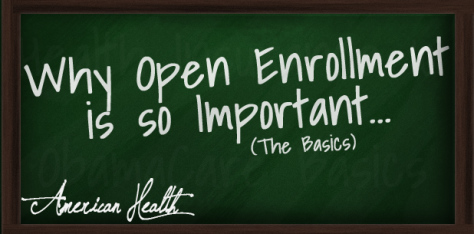Why Open Enrollment is so Important

Here at American Health, we’ve been overusing two words for the past few months. They are probably two words that you’re sick of hearing, but two words that we cannot stop stressing. These words are OPEN ENROLLMENT. Yes, there it is, I said it again. (Insert your cringing face here.)
In the past, Open Enrollment was something that typically only applied to group plans. (Also, Medicare and Medicare Supplements, but we’ll leave all of that for another blog.) It was the time of year that you were able to apply for your group health plan, discontinue your group health plan, or change your group health plan. If you didn’t apply during this time you were not able to get on your group plan until the next open enrollment.
The people who purchased private, individual health insurance, didn’t have to follow the Open Enrollment regulations. They were free to purchase, cancel, change etc… their health insurance at any time.
With the creation of The Patient Protection and Affordable Care Act, (PPACA) also known as the Affordable Care Act (ACA) in 2010, the insurance world began to change. In 2013, it changed even more dramatically when it implemented the Open Enrollment period for individual health plans.
What does this mean?
Well, in a nutshell, it means that if you want health insurance and you aren’t offered it through your employer, November 1st through January 31st is the only time you can apply. (Unless you have a qualifying event. You can read more about qualifying events here.) If you miss it, you’re out of luck.
Now, I know some of you are thinking, “Do I really need health insurance? I’m young and healthy and practically invincible!”
That may be true, but you still need health insurance.
Why? Well, for a number of reasons but mainly because there’s a mandate to have insurance and penalty if you don’t.
It’s fairly common knowledge that it’s now “illegal” to not have health insurance. Will you get thrown in jail? Not today, but will you be penalized? Oh yeah. Wanna know how much? I’ll tell you.
The penalty for not having ACA qualified health insurance in 2015 is (insert drum roll here…) 2.5% of your income, or $695 per adult and $347.50 per child – whichever is HIGHER.
Let’s break that down a little.
If you’re married with two kids and you and your spouse make $45,000 combined, 2.5% is $1125. The combined penalty for your household [$695 x 2 + $347.50 x 2 (another $695)] is $1820.00. You’re paying the $1820 to the government when you file your 2016 taxes. That could take a serious chunk out of the return that you wanted to use to take your family on vacation.
Now, for some people that might not sound like a lot of money, but if anyone in your family gets sick or has an accident (or any other health issue) during the year, you’re not just responsible for the penalty, but you now have a massive stack of bills on top of it. (An average visit to the ER can easily cost over $5000 and sometimes cost over $10,000.)
I know, I know, you’re not going to get sick, you’re not going to have an accident. You’ve already told me that you’re invincible. But, here’s the thing… you’re not.
Accidents happen. Illnesses happen. And rarely do they happen when you’re ready for it. They are unexpected and poorly timed.
Now, with anything, there are good and bad aspects to PPACA. One of the better aspects is the fact that you may qualify for a tax credit (subsidy) and/or a cost sharing reduction if you apply for your insurance through the Marketplace or the Exchange.
Huh?
The Exchange (or Marketplace) is where you purchase your insurance. It is a government website that shows you all the plans and carriers in your area and the price. There is the Federal Exchange for the majority of states, but a few states have chosen to set up their own exchange.
A tax credit, or subsidy, is an amount of money (based on your income) that the government will pay towards your monthly premium. For instance, if your premium is $100 and your tax credit is $50, you are only responsible to pay $50 a month towards your premium. Sometimes tax credits are so high that you could end up paying next to nothing for your monthly premium.
A cost sharing reduction could also be available to you, in addition to your tax credit. The cost sharing reduction reduces the out of pocket expenses on your health insurance plan. As an example, a $6000 deductible might be reduced to $750. That’s a huge difference!
Unfortunately, not everyone is eligible for a tax credit or cost sharing reduction. It is strictly based on your income. You can check to see if you qualify for a tax credit and cost sharing reduction here.
This information is only the bare bones of what’s happening in the insurance world.
Open Enrollment is quickly approaching and you need to know what to expect and what the best options are for you and your family. We can help with that.
At American Health, we have four licensed agents who are certified to sell insurance on the Federal Exchange and on most of the State Exchanges. We are knowledgeable and experienced and truly care about getting you the best plan for your situation.


Leave a Reply